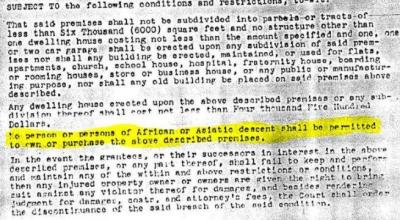Deed restrictions such as Covenants, Conditions & Restrictions (CCRs) are commonly known today for laying out rules for homeowner's associations. However, people who own older residential property may also find racial restrictive covenants in their property deed and CCRs.
While racial restrictive covenants are not enforceable, the presence of the language has made its way to the Oregon State Legislature. In 2018, the Legislature passed two laws — ORS 93.270 and ORS 93.274 — that are intended to make it easier for property owners to remove racist provisions from the title of their property through state circuit courts.
How do I learn if racial restrictive covenants appear in my property's deed and CCRs?
The documents you signed when you purchased your home will include the deed and CCRs. A close review of these documents will reveal whether racial restrictive covenants were applied to your property. Note that the restrictions are often embedded and may be limited to a single sentence or short paragraph.

If you are not able to locate the documents, you can obtain a copy of the deed from your county or by contacting a title company. A fee may apply.
Linn County Assessor
541-967-3808
Benton County Records & Election Department
Check online
541-766-6831
What is the process to remove discriminatory restrictions?
The laws passed in 2018 aim to ease the removal of discriminatory restrictions from property records, using a procedure detailed in ORS 93.274. Please note this is not a City process. All inquiries should be directed to your county’s circuit court.
Form:
Petition to Remove Discriminatory Provisions from Title to Real Property
Contact:
Linn County Circuit Court
https://www.courts.oregon.gov/courts/linn/Pages/default.aspx
541-967-3845
300 4th Avenue SW, Albany, OR 97321
Benton County Circuit Court
https://www.courts.oregon.gov/courts/benton/Pages/default.aspx
541-243-7850
120 NW 4th Street, Corvallis, OR, 97330
History of Racial Restrictive Covenants
The Civic Unity Committee, in a 1946 publication, defined racial restrictive covenants as: “agreements entered into by a group of property owners, sub-division developers, or real estate operators in a given neighborhood, binding them not to sell, lease, rent or otherwise convey their property to specified groups because of race, creed or color for a definite period unless all agree to the transaction.”
Racial restrictive covenants began in the mid-19th century and were recorded when a lot was created, when a subdivision was approved, or when a home was built. Later, during the Great Depression, the National Housing Act of 1934 was passed with the intention of keeping banks from exceeding their loan reserves. Banks responded with the practice of redlining. Redlining identified areas on city maps where bank investments and sales of mortgages were preferred and redlined areas where lenders were discouraged from financing properties. This practice ultimately provided financial incentives to include racial restrictive covenants while also refusing financing to people of color in the only neighborhoods where they were allowed to purchase. This type of systemic racism became widespread across America, prohibiting the building of wealth through homeownership and deepening segregation based on race, color, and creed.
The U.S. Supreme Court found racial restrictive covenants to be legally unenforceable in 1948 based on the Equal Protection Clause of the Fourteenth Amendment. The ruling established that courts would not enforce the covenants but did not prohibit the inclusion of racial restrictions in covenants or prevent private enforcement. It was not until the passage of the Federal Fair Housing Act of 1968 that the racial restrictive covenants became illegal. This means that those who own residential property built before 1968 could very likely find language in their own CCRs that reflects our history of exclusion in housing.
Over 50 years have passed since racial covenants became illegal, but the nation continues to see significantly different rates of homeownership for various racial groups. Fair Housing compliance checks across the country also continue to identify real estate transactions where racial bias limits access for renters and homeowners. In 2020, the U.S. Census Bureau reports the following homeownership rates among Americans:
- White, 76%
- Asian, native Hawaiian, and Pacific Islanders, 61.4%
- Hispanic, 51.4%
- Black, 47%


